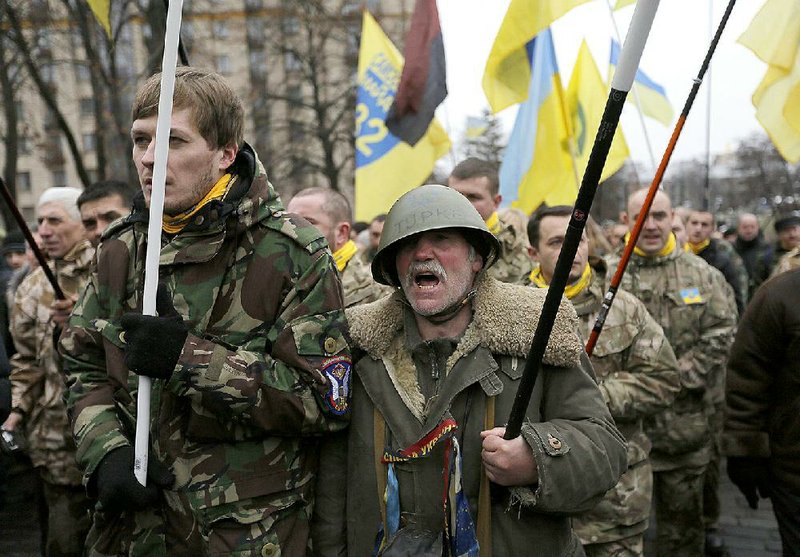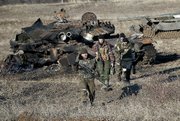KIEV, Ukraine -- A bomb blast killed two at a march in east Ukraine on Sunday on the first anniversary of the ouster of the country's Russia-friendly president, a counterpoint to the hopes spawned by a cease-fire agreement more than a week ago.
An exchange of prisoners over the weekend and acknowledgment by both sides of a commitment to pull back heavy weapons are signs that peace may yet prevail, although sporadic exchanges of hostilities between government and separatist forces have yet to entirely subside.
Ukraine's Interior Ministry said the blast at a march in the eastern city of Kharkiv to mark the ouster of President Viktor Yanukovych was due to an "unknown explosive device" and was considered a terrorist act. A police officer was one of the dead and about a dozen people were injured, the ministry said.
A spokesman for the national security service, Markian Lubkivskiy, said four suspects had been arrested in connection with the bombing. He said in a statement on his Facebook account that the suspects were detained while carrying a portable rocket launcher in their automobile and that they appeared to be acting under instructions from Russia.
"We can clearly see that the launcher was received from the [Russian city of] Belgorod. Instructions were received from the Russian Federation," he said in broadcast remarks.
Lubkivskiy did not specify if he was accusing private individuals in Russia or the government in Moscow.
The bomb was planted near the route of Sunday's rally, the regional prosecutor's office said on its website, contradicting earlier witness accounts that it had been thrown from a passing car. City officials said today will be a day of mourning in Kharkiv.
President Petro Poroshenko said on his Facebook page that the blast "is a brazen attempt to expand the realm of terrorism."
He said Ukrainian security services prevented another terrorist attack in the city of Odessa.
A bomb was found in a shopping bag on a street in Odessa, a port on the Black Sea. It was disabled by police.
The Ukrainian authorities say they are struggling to rein in a pro-Moscow underground movement that is growing more active in Kharkiv, Odessa and other cities, mainly in the east, where the population is predominantly Russian speaking. Bombings and assassinations have been frequent.
In Kharkiv, bombs have gone off in a bar frequented by pro-Kiev activists and in a crowd outside a courthouse. Elsewhere, assailants have fired shots at volunteers collecting aid for the Ukrainian army.
The violence in Kharkiv comes as Ukraine continues to be riven by tension and bloodshed stemming from Yanukovych's fall. The Ukrainian parliament voted Feb. 22, 2014, to remove him, after months of increasingly violent protests in the capital, Kiev.
The Crimean Peninsula, where residents largely regarded his downfall as a coup, was annexed by Russia a month later.
Then armed rebels opposed to the new authorities in Kiev took over large parts of two regions bordering Russia, setting off a war that has killed more than 5,600 people.
A peace plan envisioning a cease-fire and pullback of heavy weapons was signed this month.
Ukraine planned to begin withdrawing heavy weaponry from the front lines Sunday, Ukrainian military spokesman Col. Andriy Lysenko said in a briefing, but gave no details.
Rebel spokesman Eduard Basurin said the pullback from both sides is to take place between Sunday and March 7, but he did not say whether rebels had made any moves yet. There was no immediate confirmation that the withdrawal had begun.
Both sides are to pull back their big guns and rockets from 15 to 43 miles away from the conflict line -- depending on the weapons' size -- creating a buffer zone of between 31 and 87 miles.
The buffer zone was a main element of a peace agreement worked out by leaders of Russia, Ukraine, Germany and France. Late Saturday, 139 Ukrainian soldiers and 52 rebels were exchanged, as called for in the peace plan; it remains unclear how many prisoners may remain on each side and when any other swaps might take place.
The cease-fire that was the first element of the plan was called into effect Feb. 15.
Ukraine said Russia-backed separatists violated the cease-fire a dozen times Saturday night with artillery and rocket attacks and an attempt to storm a Ukrainian encampment. Lysenko said one serviceman was killed and three were wounded.
Loud explosions rang through Donetsk early Sunday. Rebel officials said it was a government artillery strike on the city's outskirts, but the Ukrainian military said it was a rebel barrage into the village of Pisky, just northwest of the city.
Later in the day, sustained bursts of machine-gun fire were heard coming from a government-held suburb adjacent to the city's now-obliterated international air terminal.
However, the level of firing appeared to be far lower than a week ago.
Among the attacks reported by the Ukrainian military was an attempt to storm positions in the village of Shyrokyne near the port city of Mariupol. Rebel seizure of Mariupol could help establish a land corridor between mainland Russia and the Crimean Peninsula.
More than 14 drones were observed near Mariupol during the past 24 hours, Defense Ministry spokesman Anatoliy Stelmakh said in a video statement posted on YouTube.
Associated Press journalists in Bezimenne, the final rebel-held village along the shore before Shyrokyne, heard sporadic outgoing blasts late Sunday afternoon.
"They fire at us, and we fire at them in return," said Oleg, a rebel fighter who said he arrived from the Russian city of Yekaterinburg. He declined to provide his surname as he has not told all of his family he is fighting in Ukraine.
Lysenko said government forces in Shyrokyne repulsed the rebel attack Sunday.
Tensions also remain high around Debaltseve, a strategic railway hub captured by separatists after intense battles last week. Rebel forces in Lohvynove, a village just north of Debaltseve, said they continue to be targeted by Ukrainian artillery.
"At the moment, it's quiet. But in a couple of hours, they will start to fire at our positions," said rebel fighter Alexander, who also identified himself by the nom de guerre Tok. As he spoke, an explosion in the distance prompted him to turn around sharply. "There it bangs again. Maybe something will fly this way."
The International Committee of the Red Cross said in a statement that it delivered food, medical supplies and other essential items over the weekend to the roughly 5,000 people trapped in Debaltseve by heavy fighting over the past week.
Ukraine accused Moscow of sending more troops into the east of the country, contravening the Europe-brokered truce that was agreed upon in Minsk. U.S. officials said at the time that they wouldn't rule out imposing tougher sanctions on Russia or giving more security assistance to Ukraine if the peace deal wasn't fully implemented.
"Russia continues to arm militants in Donbas in defiance of the Minsk agreements," Lysenko told reporters in Kiev on Sunday. "If the separatists did not receive military equipment, munitions, instructors, fighters from Russia, we would have long since reinstalled the integrity of our country."
U.S. Secretary of State John Kerry warned Saturday in London that more sanctions may be imposed against Russia if violations of the truce continue.
In Kiev, thousands participated in a march Sunday commemorating the events of a year ago and honoring the more than 100 protesters who died during the uprising. Poroshenko led the ceremony, joined by representatives including the presidents of Poland, Lithuania, Germany, Georgia and the European Union.
Information for this article was contributed by Jim Heintz, Peter Leonard and Dalton Bennett of The Associated Press; by Aliaksandr Kudrytski, Daryna Krasnolutska and Kateryna Choursina of Bloomberg News; and by Andrew E. Kramer of The New York Times.
A Section on 02/23/2015


